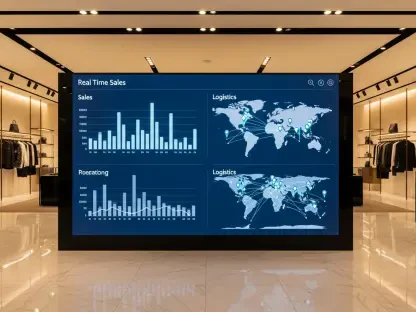In an era increasingly characterized by a “phygital” convergence—the blending of physical and digital retail environments—emerging technologies like IoT, omnichannel strategies, and AI are at the forefront. Retailers worldwide, including those in Indonesia and China, are adapting to these trends by integrating Point of Sale (POS) systems to streamline transactions. These efforts are helping retailers forge closer customer relationships, ultimately enhancing the retail experience. This analysis explores major themes, key trends, and overarching viewpoints on the adoption of POS systems, focusing on how Indonesia and China are navigating this transformation.
Technological Evolution and Consumer Behavior
The integration of digital commerce has significantly influenced consumer behavior, compelling retailers in the Asia Pacific, especially in Indonesia and China, to adopt modern POS systems. These systems serve not just to manage transactions but also to enhance consumer interaction and satisfaction. McKinsey’s analysis underscores that the “store of the future,” supported by advanced technology, can double profits for retailers while delivering a superior customer experience.
Retailers are increasingly leveraging AI and IoT to create seamless shopping experiences. In China, for instance, AI-driven POS systems are being used to analyze consumer behavior, predict trends, and personalize shopping experiences. Similarly, Indonesian retailers are adopting omnichannel strategies to integrate online and offline shopping, providing a cohesive customer journey. This evolution towards technological sophistication helps retailers meet the dynamic demands of modern consumers who seek personalized and efficient shopping experiences.
Moreover, POS systems equipped with AI capabilities can track customer preferences and buying patterns, offering personalized recommendations. This can lead to increased customer loyalty and repeat business. IoT integration, on the other hand, allows real-time inventory management, reducing stockouts and overstock situations. Both China and Indonesia are focusing on these advanced technologies to stay competitive in a rapidly evolving retail landscape. By embracing these innovations, retailers can optimize their operations, enhance the shopping experience, and maintain a competitive edge.
Market Projections and Growth
Indonesian retail revenue is projected to increase by USD 49.56 billion, with a CAGR of 4.73% from 2024 to 2028, according to Technavio’s 2024 research. This growth is driven by the increasing adoption of digital payment methods and the integration of advanced POS systems. Retailers in Indonesia are focusing on enhancing customer experience through efficient transaction management and personalized services, leveraging POS systems to facilitate these improvements seamlessly. This significant growth projection underscores the importance of technology in driving the retail industry’s expansion in Indonesia.
China’s use of POS systems has seen a sharp uptick and is expected to grow at a CAGR of 5.23% over the next five years, as per Mordor Intelligence. The surge in digital transactions, driven largely by e-wallets and supported by government policies promoting digital payments, is a significant factor in this growth. Retailers in China are investing in cutting-edge POS technologies to stay competitive and meet the evolving demands of tech-savvy consumers. This emphasis on modernization aligns with China’s broader strategy to become a global leader in digital commerce and fintech.
Furthermore, both countries’ retail sectors are poised for exponential growth, driven by technological adoption and consumer demand for seamless shopping experiences. The integration of AI and IoT in POS systems enables retailers to optimize their operations, enhance customer engagement, and drive revenue growth. As Indonesia and China continue to innovate and expand their digital infrastructure, the retail landscape is set to transform dramatically, offering new opportunities for businesses and consumers alike. These advancements will likely set a benchmark for other countries looking to modernize their retail sectors.
Regulatory Dynamics
Regulatory frameworks play a crucial role in the adoption and effectiveness of POS systems. In China, firms like Alipay and WeChat Pay dominate due to stringent regulations from the People’s Bank of China (PBOC), which ensures data security and tax compliance. These regulations have created a secure and standardized environment for digital payments, fostering consumer trust and widespread adoption. The PBOC’s oversight ensures that all transactions are transparent and that data is protected, which is vital for maintaining consumer confidence in digital payment systems.
Similarly, in Indonesia, platforms like GoBiz from Gojek and Moka POS are crucial for transaction management, integrated with payment methods like QRIS. These systems facilitate secure and standardized digital payments, backed by regulatory support from entities like Bank Indonesia. The regulatory landscape in Indonesia is evolving, with increasing emphasis on data security and compliance to align with global standards. This progression indicates a commitment to creating a secure and reliable digital payment ecosystem, essential for fostering consumer and business trust.
Moreover, regulatory bodies in both countries play an active role in shaping the future of retail by implementing guidelines that ensure the effectiveness and security of POS systems. China’s comprehensive regulatory framework, which includes strict data protection laws and tax compliance requirements, serves as a model for Indonesia. As Indonesia continues to develop its policies, it may benefit from adopting similar stringent measures to enhance its retail sector’s robustness. By aligning with global best practices, both countries can ensure sustainable growth and innovation in their retail landscapes.
Data Security and Information Protection
A pivotal factor in the successful implementation of POS systems is data security. China’s Personal Information Protection Law (PIPL), enacted in 2021, mandates the protection of personal data, overseen by the Cyber Administration of China (CAC). Retail giants like JD.com and Alibaba ensure their POS systems comply with security standards like PCI DSS, providing a secure environment for digital transactions. This rigorous approach to data security is crucial for maintaining consumer trust and encouraging the adoption of digital payment systems.
Indonesia’s Personal Data Protection (PDP) Law similarly mandates that all customer data be securely stored and accessible only to authorized business owners. Platforms like Moka POS use cloud technology to meet these requirements, ensuring data security and building consumer trust. The emphasis on data protection is crucial for the widespread adoption of POS systems, as consumers become increasingly aware of privacy issues. Ensuring that personal information is safeguarded can significantly enhance consumer confidence in digital transactions.
Additionally, data security measures are becoming more sophisticated, with advanced encryption technologies and real-time monitoring systems being integrated into POS solutions. Both China and Indonesia are prioritizing these enhancements to safeguard consumer data and prevent breaches. As cybersecurity threats evolve, continuous improvements in data protection protocols will be essential for maintaining the integrity of digital payment systems. By investing in robust security measures, retailers can protect their customers’ data and foster a secure digital transaction environment.
Tax Regulations and Compliance
POS systems in both countries are regulated to ensure proper tax documentation and compliance. In China, POS systems must integrate with the Drummer platform for electronic invoicing, assisting the government in tax data verification and preventing evasion. This integration ensures transparency and compliance, making it easier for businesses to manage their tax obligations. By streamlining tax processes through technology, China has been able to improve tax collection efficiency and reduce fraudulent activities.
Indonesia’s POS systems adhere to Directorate General of Taxes (DGT) regulations, requiring integration with fiscal tools for accurate transaction reporting and e-Invoice generation. These regulations are designed to streamline tax processes and ensure compliance, reducing the administrative burden on businesses and promoting a fair tax environment. By mandating the use of POS systems that comply with these regulations, Indonesia ensures that all retail transactions are accurately recorded and reported, contributing to a more transparent and accountable retail sector.
Moreover, the emphasis on tax compliance not only aids government revenue collection but also enhances the credibility of the retail ecosystem. Businesses that adhere to these regulations can avoid penalties and foster better relationships with regulatory authorities. Both countries recognize the importance of integrating tax compliance features into POS systems, ensuring that retailers can focus on their core operations without worrying about intricate tax requirements. This approach ultimately benefits the entire retail industry by promoting fair practices and reducing tax-related discrepancies.
Payment System Integration and Financial Compliance
In an age marked by the blending of physical and digital retail environments—known as “phygital” convergence—emerging technologies like the Internet of Things (IoT), omnichannel strategies, and artificial intelligence (AI) are leading the way. Retailers globally, particularly in Indonesia and China, are adapting to these advancements by incorporating Point of Sale (POS) systems to simplify transactions. These innovations assist retailers in building stronger customer relationships, ultimately improving the overall retail experience. This analysis delves into the main themes, significant trends, and broad perspectives surrounding the adoption of POS systems, with a focus on how Indonesia and China are navigating through this transformation. In these countries, the implementation of POS systems is not just about transaction efficiency but also about leveraging data to offer personalized services, enhance inventory management, and create seamless shopping experiences. Such strategies demonstrate a proactive approach to embracing the phygital future of retail, reflecting a broader global movement towards integrating advanced technology to stay competitive.









